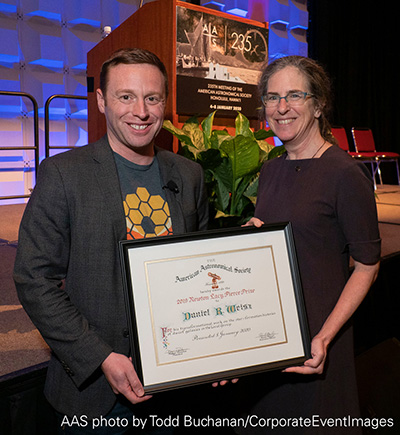Changes to the AAS Prize Nomination Process

Alice Monet US Naval Obs. (retired); AAS Secretary
 Nominations for AAS prizes and honors will open in the next few days, and all AAS members are encouraged to submit nominations for themselves or for their colleagues to recognize significant contributions to the astronomical sciences (including by amateur astronomers), instrumentation, education, writing, and service. This year the deadline will be 31 July rather than the usual 30 June since we’re getting a late start. Nominators will encounter a process that has changed significantly since last year. While none of us really enjoys “reading the manual,” this time you might want to!
Nominations for AAS prizes and honors will open in the next few days, and all AAS members are encouraged to submit nominations for themselves or for their colleagues to recognize significant contributions to the astronomical sciences (including by amateur astronomers), instrumentation, education, writing, and service. This year the deadline will be 31 July rather than the usual 30 June since we’re getting a late start. Nominators will encounter a process that has changed significantly since last year. While none of us really enjoys “reading the manual,” this time you might want to!
What Has Changed
The nominator will identify the individual or the work being nominated for a prize, providing the name, institution, and current contact (email or phone number) of the nominee. The nominator will also provide the names and contact information of three people who have agreed to write letters of support. Except in cases of self-nomination, the nominator may provide one of the three letters.
The nominee (who may also be the nominator) will provide the following:
- Completed professional ethics self-disclosure form*
- Complete contact information, including a mailing address
- A current curriculum vitae (CV) and bibliography
- Three abstracts of publications that support the prize nomination
- For early career prizes, the nominee’s year of birth and year of PhD.
*A nomination cannot be accepted without the ethics self-disclosure form.
For prizes that have limitations on age or career stage, nominees may use the nomination form to request a waiver if their careers have been interrupted by a documented family or medical leave.
While nominators are required to identify themselves, this information will not be shared with the prize review committees or the nominees. It’s needed by the administrators to enable them to contact nominators regarding any issues with, or questions about, the nominations.
The ethics self-disclosures are also confidential. If nominees have questions or wish to disclose anything, they will be able to speak directly with the AAS President or Secretary regarding their concerns. After the disclosure form and other information has been completed, the review committee will be informed that the nomination is eligible for consideration.
Another major change is in the instructions for writing letters of support. Letter writers are no longer required to address issues of professional ethics for the nominees.
There has also been a change to the Prize Nominations web page: We’ve added a checklist to help nominators and nominees collect and organize the information required to complete a nomination before they enter the OpenWater system to submit it.
Why the Changes?
The goal in making these changes is to make the nomination process easier to complete, since nominators will not have to find the latest CV, request a bibliography, or try to figure out when a nominee was born or completed the PhD. Nominees will be able to “put their best foot forward” in providing their current CV, bibliography, and abstracts, and nominees for early career prizes will be able to provide accurate birth dates and the years of their degrees. Those writing letters of support won’t have to consider a nominee’s ethical behavior (though they may still decide to do so). Finally, by completing the ethics self-disclosures, nominees can let the review committees know that the awarding of the prizes won’t be derailed by an unanticipated ethical issue.
We hope these updates to the AAS prize process will reduce barriers to submitting nominations and encourage more people to nominate themselves or their colleagues for AAS prizes and honors. Recognizing excellence in research, instrumentation, education, writing, and service to the community is an important part of the work of the AAS that benefits all its members.

